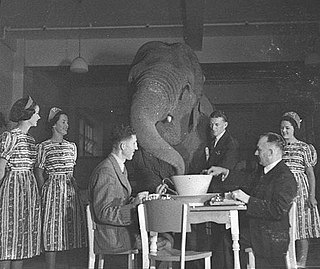An idiom is a phrase or expression that usually presents a figurative, non-literal meaning attached to the phrase. Some phrases which become figurative idioms, however, do retain the phrase's literal meaning. Categorized as formulaic language, an idiom's figurative meaning is different from the literal meaning. Idioms occur frequently in all languages; in English alone there are an estimated twenty-five thousand idiomatic expressions.
"Chinese fire drill" is a slang term for a situation that is chaotic or confusing, possibly due to poor or misunderstood instructions.

Chink is an English-language ethnic slur usually referring to a person of Chinese descent, but also used to insult people of East Asian, North Asian, Southeast Asian appearance. The use of the term describing eyes with epicanthic fold is considered extremely offensive and is regarded as racist by many.

The expression "the elephant in the room" is a metaphorical idiom in English for an important or enormous topic, question, or controversial issue that is obvious or that everyone knows about but no one mentions or wants to discuss because it makes at least some of them uncomfortable and is personally, socially, or politically embarrassing, controversial, inflammatory, or dangerous. The metaphorical elephant represents an obvious problem or difficult situation that people do not want to talk about.

RAS syndrome, where RAS stands for redundant acronym syndrome is the redundant use of one or more of the words that make up an acronym in conjunction with the abbreviated form. This means, in effect, repeating one or more words from the acronym. For example: PIN number and ATM machine.
Ching chong, ching chang chong, and chung ching are ethnic slurs used to mock or imitate the Chinese language, people of Chinese ancestry, or other people of East Asian descent perceived to be Chinese. The term is a derogatory imitation of Mandarin and Cantonese phonology. The phrases have sometimes accompanied assaults or physical intimidation of East Asians, as have other racial slurs or imitation Chinese.

Eating crow is a colloquial idiom, used in some English-speaking countries, that means humiliation by admitting having been proven wrong after taking a strong position. The crow is a carrion-eater that is presumably repulsive to eat in the same way that being proven wrong might be emotionally hard to swallow. The exact origin of the idiom is unknown, but it probably began with an American story published around 1850 about a dim-witted New York farmer.

Jason Lee Whitlock is an American sports columnist, podcaster, and former football player. He hosts a program for the conservative media company Blaze Media titled Fearless with Jason Whitlock. Whitlock is a former columnist at The Kansas City Star, AOL Sports, Foxsports.com, and ESPN. He was a radio personality for WHB and KCSP sports stations in the Kansas City area. Whitlock played Division I college football at Ball State as an offensive lineman.
Taking the piss is a colloquial term meaning to mock at the expense of others, or to be joking, without the element of offence. It is also sometimes phrased as a question, 'are they taking the piss?', when referring to an individual who takes above and beyond what is thought acceptable, similar to the expression, 'give them an inch and they take a mile.' It is a shortening of the idiom taking the piss out of, which is an expression meaning to mock, tease, joke, ridicule, or scoff. It is not to be confused with "taking a piss", which refers to the act of urinating. Taking the Mickey, taking the Mick or taking the Michael are additional terms for making fun of someone. These terms are most often used in the United Kingdom, Ireland, South Africa, New Zealand, and Australia.
"Hold your horses", sometimes said as "Hold the horses", is an English-language idiom meaning "wait, slow down". The phrase is historically related to horse riding or travelling by horse, or driving a horse-drawn vehicle. A number of explanations, all unverified, have been offered for the origins of the phrase, dating back to usage in Ancient Greece.
"My two cents" and its longer version "put my two cents in" is an American and Australian idiomatic expression, taken from the original English idiom "to put in my two-penny worth" or "put my tuppence in".
To "trip the light fantastic" is to dance nimbly or lightly to music. The origin of the phrase is attributed to John Milton.
Guy Aoki is an American civil rights activist. He is the leader of the Media Action Network for Asian Americans (MANAA), which he co-founded in 1992. He is also a contributing columnist for the Rafu Shimpo, and debates publicly on Asian American issues.
Maximiliano Bretos is an American sports reporter and sports announcer, who is currently the play-by-play announcer for MLS broadcasts on Apple TV. He formerly hosted ESPN Major League Soccer and SportsCenter for ESPN as well as being the lead announcer for Fox Soccer from 2003-2010 and Los Angeles FC from 2018-2022. Bretos' broadcast specialization is Football.
Chinaman is an offensive term referring to a Chinese man or person, or widely a person native to geographical East Asia or of perceived East Asian ethnicity. The term is noted as having pejorative overtones by modern dictionaries. Its derogatory connotations evolved from its use in pejorative contexts regarding Chinese people and other East Asians, as well as its grammatical incorrectness which resembles stereotypical characterizations of Chinese accents in English-speaking associated with discrimination. The usage of the term Chinaman is strongly discouraged by Asian American organizations.
"Call a spade a spade" is a figurative expression. It refers to calling something "as it is"—that is, by its right or proper name, without "beating about the bush", but rather speaking truthfully, frankly, and directly about a topic, even to the point of bluntness or rudeness, and even if the subject is considered coarse, impolite, or unpleasant.

An idiom is a common word or phrase with a figurative, non-literal meaning that is understood culturally and differs from what its composite words' denotations would suggest; i.e. the words together have a meaning that is different from the dictionary definitions of the individual words. By another definition, an idiom is a speech form or an expression of a given language that is peculiar to itself grammatically or cannot be understood from the individual meanings of its elements. For example, an English speaker would understand the phrase "kick the bucket" to mean "to die" – and also to actually kick a bucket. Furthermore, they would understand when each meaning is being used in context.
"No homo" is a slang phrase used at the end of a sentence to assert the statement or action by the speaker had no intentional homosexual implications. The phrase is also "added to a statement in order to rid [oneself] of a possible homosexual double-entendre".

Jeremy Shu-How Lin is a Taiwanese-American professional basketball player for the New Taipei Kings of the P. League+ (PLG). He unexpectedly led a winning turnaround with the New York Knicks of the National Basketball Association (NBA) during the 2011–12 season, sparking a cultural phenomenon known as "Linsanity". Lin was the first American of Chinese or Taiwanese descent to play in the NBA, and is one of the few Asian Americans to have played in the league. He is the first Asian American player to win an NBA championship, having done so with the Toronto Raptors in 2019.
Idiom, also called idiomaticness or idiomaticity, is the syntactical, grammatical, or structural form peculiar to a language. Idiom is the realized structure of a language, as opposed to possible but unrealized structures that could have developed to serve the same semantic functions but did not.







